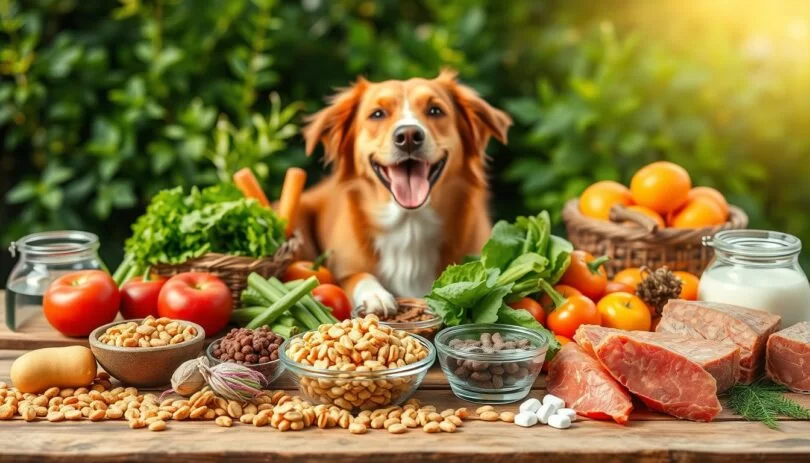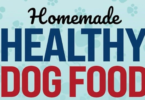Proper nutrition is key for a dog's health and happiness1. A balanced diet helps keep their immune system strong, skin and coat healthy, and digestion optimal1. It also helps prevent issues like obesity and allergies.
Dogs need different nutrients at different life stages, like puppies, adults, and seniors1. Knowing these needs is crucial for feeding them right at every stage.
Key Takeaways
- Proper nutrition is crucial for a dog's overall health and well-being.
- Dogs have unique nutritional needs based on their life stage, such as puppies requiring more calories, protein, and essential nutrients.
- A balanced diet supports a dog's immune system, skin, coat, and digestion.
- Various dog food options, including kibble, wet food, and raw diets, each have their own benefits and considerations.
- Understanding dog food labels and ingredients is important to make informed choices about your pet's nutrition.
Understanding Canine Nutrition Basics
Dogs, being omnivores, can get their nutrients from both plants and animals2. A balanced diet for them includes minerals, vitamins, amino acids, and fatty acids2. They can also digest carbs, thanks to enzymes in their digestive system2.
The Role of Essential Nutrients
Dogs need six key nutrients: water, proteins, fats, carbs, minerals, and vitamins2. The Association of American Feed Control Officials (AAFCO) sets standards for pet food3. This ensures the food meets their nutritional needs.
Importance of Balanced Diet
A balanced diet is key for a dog's health2. The right amount of calories for an adult dog is 30 x weight in kg + 702. Feeding them once or twice a day is best2.
Dry and canned dog food are similar in nutrition2. But, some dogs might need special diets based on their breed and lifestyle2.
Water Requirements for Dogs
Water is vital for dogs, and they should always have fresh water2. The amount they need depends on their activity, diet, and environment2. Keeping them hydrated is crucial for their health.

“Proper nutrition is the foundation for a dog's health and longevity. Understanding the role of essential nutrients and the importance of a balanced diet is crucial for pet owners.”23
Different Life Stages and Nutritional Needs
As dogs grow, their diet needs change. Puppies need more calories, protein, and nutrients for fast growth4. Large and giant breed puppies need special diets to avoid health issues4.
Young adult and middle-aged dogs need a balanced diet for their age4. Senior dogs might need more protein to keep their muscles strong4.
Pregnant or nursing dogs need extra nutrients for their health and their puppies' growth4. Foods for puppies and kittens can also help during these times4.
Some diets are for all life stages, but they might not fit all dogs' needs4. Regular vet visits can help find the right diet for your dog's age and health4.
It's key to match your dog's diet to their life stage for their health45. Tailoring their diet helps them thrive at every age45.
| Life Stage | Nutritional Needs |
|---|---|
| Puppy |
|
| Adult |
|
| Senior |
|
| Pregnant/Lactating |
|
“Proper nutrition is essential for dogs at every stage of their life, from puppyhood to the senior years. By understanding their evolving needs, pet owners can ensure their canine companions thrive and maintain optimal health.”
Types of Dog Food and Their Benefits
Pet owners have many dog food options. From kibble6 to raw diet, each has its benefits and things to consider.
Commercial Kibble Options
Kibble is the most common dog food6. It's made from meat, carbs, and vitamins6. Kibble is easy to use, good for teeth, and lasts a long time6. But, it might not be enough water for some dogs7.
Wet Food Considerations
Wet dog food is the second favorite6. It has more water and tastes better than kibble6. It's pricier but good for dogs needing more water or special diets8. Yet, it has less nutrients than kibble8.
Raw Diet Pros and Cons
The raw diet tries to be like a dog's natural food. It includes raw meat, bones, and sometimes veggies and fruits8. It might make your dog's teeth and coat better7. But, it can be risky for bacteria and might not have the right nutrients7.
Choosing the right dog food depends on your dog's needs, your life, and your vet's advice. No matter the food, quality and balance are key for your dog's health.
“For more information on specialty diets, contact the provided number at (856) – 694 – 0980.”
Reading and Understanding Dog Food Labels
Understanding dog food labels is key to your dog's health. Knowing the 95% Rule and the “With” Rule helps you choose the right food for your pet9. These rules guide you in making the best diet choices for your dog9.
The 95% Rule means at least 95% of the product must be the named ingredient, like “Chicken for Dogs.”9 The 25% Rule requires a term like “dinner” if the main ingredients are 25% to 95% of the product9. The “With” Rule means the ingredient after “with” must be at least 3% of the product9.
Looking at the guaranteed analysis on labels is very helpful. It shows the percentages of protein, fat, fiber, and water9. Ingredients are listed by weight, showing what's in the food9. Nutritional statements confirm the food is complete and balanced for your dog's life stage9.
It's also important to know the calories per cup. This helps you avoid overfeeding and keeps your pet healthy9. Understanding “minimum” and “maximum” percentages helps you meet your dog's dietary needs9.
Labels may also talk about organic ingredients, new protein sources, and health concerns like heart disease from grain-free diets9. Knowing these details helps you choose the best food for your dog's health and happiness.
| Regulation | Description |
|---|---|
| AAFCO Nutrient Profiles | Developed two nutrient profiles for dogs, one for growth and reproduction and one for adult maintenance10. The adult maintenance formulation provides lower amounts of nutrients to avoid excesses10. |
| FDA Center for Veterinary Medicine | Regulates dog food production and evaluates any health claims on labels10. |
| CFIA in Canada | Regulates imported pet foods containing certain animal products10. |
| Health Canada | Enacts legislation to prevent unsubstantiated health claims on pet food labels10. |
Understanding dog food labels helps you make better choices for your pet's health. Whether it's kibble, wet food, or raw diets, being informed ensures your dog gets the best nutrition.
“Over 95% of pet foods comply with AAFCO Models and federal regulations, indicating high industry compliance with pet food labeling standards.”11
Special Dietary Considerations and Restrictions
Some dogs need special diets because of food allergies, sensitivities, or health issues. It's important to know these needs to keep your dog healthy.
Grain-Free Diets
Grain-free diets are popular, but not all dogs need them. It's good to keep treats to 5 to 10 percent of a dog's diet.12 Large treats can be cut into smaller pieces to control how much they eat.12 If your dog doesn't have grain allergies, a balanced diet with grains can be best.
Food Allergies and Sensitivities
Without a balanced diet, dogs can face health problems like obesity and lethargy.13 Food allergies and sensitivities can cause skin issues and digestive problems. If your dog shows these signs, talk to your vet to find the right diet.
Prescription Diets
Dogs at different life stages need different nutrients.13 Prescription diets help with health issues like kidney disease and diabetes. A vet can help choose the right diet for your dog.
Talking to your vet is key to figuring out if your dog needs a special diet. Good nutrition is vital for your dog's health.13
| Dietary Consideration | Potential Issues | Recommended Approach |
|---|---|---|
| Grain-Free Diets | May not be necessary for all dogs | Consult with veterinarian to determine if a grain-free diet is appropriate |
| Food Allergies and Sensitivities | Skin irritation, digestive issues, and other symptoms | Work with veterinarian to identify the underlying cause and develop a tailored diet plan |
| Prescription Diets | Designed to manage specific health conditions | Consult with veterinarian to determine if a prescription diet is necessary |
“Proper nutrition is crucial for a pet's overall health and well-being.”13
Conclusion
Keeping dogs healthy is key to their well-being. The right pet diet depends on their age, size, and how active they are14. It's important to watch their weight and adjust their food as needed15.
Talking to a vet can help find the best food for your dog14. Treats should only make up 10% of their daily calories14. With good food, dogs can stay healthy and have a strong bond with their owners.
A balanced diet is vital for a dog's health. Omega-3 and omega-6 fatty acids keep their skin and coat healthy16. The right amount of calcium and phosphorus helps prevent dental problems and bone diseases16.
Choosing the right dog treat recipes is important for their health. Regular exercise and controlling portions help keep them at a healthy weight15. With proper care, dogs can live long, happy lives with their owners.
Source Links
- https://k9sprinter.com/the-ultimate-guide-to-canine-nutrition-what-to-feed-your-dog-for-optimal-health/
- https://vcahospitals.com/know-your-pet/nutrition-general-feeding-guidelines-for-dogs
- https://www.petmd.com/dog/nutrition/evr_dg_whats_in_a_balanced_dog_food
- https://www.tvmf.org/articles/life-stage-nutrition-for-pets/
- https://www.hudsonanimalhospitalnyc.com/services/dogs/blog/understanding-your-dogs-nutritional-needs-different-life-stages
- https://www.halohouseanimalresort.com/different-types-dog-food-and-their-benefits/
- https://www.justfoodfordogs.com/blog/types-of-dog-food.html?srsltid=AfmBOorxR0Yrx0i9V2l4-Vk8CTNasLUrAzFxS7O0WfQALBEiv0ZYZTMK
- https://www.nylabone.com/dog101/types-of-dog-food
- https://www.akc.org/expert-advice/nutrition/how-to-read-a-dog-food-label/
- https://vcahospitals.com/know-your-pet/deciphering-dog-food-labels
- https://www.aafco.org/consumers/understanding-pet-food/reading-labels/
- https://www.medivetgroup.com/pet-care/pet-advice/your-complete-guide-to-dog-nutrition/
- https://cornerstoneanimal.net/nutrition-101-feeding-your-pet-for-optimal-health/
- https://thesavvysitter.org/blog/canine-nutrition-understanding-your-dogs-dietary-needs
- https://www.hudsonanimalhospitalnyc.com/services/dogs/dog-nutrition
- https://www.summitanimalhospitalil.com/the-impact-of-nutrition-on-pet-health-insights-from-veterinary-science.html











Leave a Comment